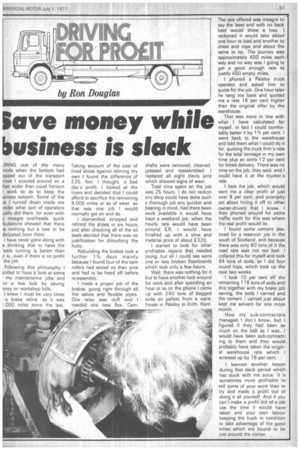lave money while business is slack
Page 59

If you've noticed an error in this article please click here to report it so we can fix it.
by Ron Douglas
JRING one of the many nods when the bottom had opped out of the transport 3rket I scouted around on a then wider than usual horizon r work so as to keep the isiness solvent Some of the DS I turned down made me )nder what sort of operators .ually did them, for even with y meagre overheads, quick lculations showed that there 3s -nothing but a loss to be ticipated, from them.
I have never gone along with e thinking that to have the leels turning is better than it to, even if there is no profit the job.
Following this philosophy I cided to have a look at some my maintenance jobs and rn a few bob by saving oney on workshop bills.
I knew I must be very close a brake reline, as it was 1,000 miles since the last. Taking account of the cost of lined shoes against relining my own I found the difference of £25. Not, I thought, a bad day's profit. l looked at the liners and decided that I could afford to sacrifice the remaining 8,000 miles or so of wear, so that was one job I would normally get on and do.
I dismantled, stripped and relined the shoes in six hours, and after checking all of the oil seals decided that there was no justification for disturbing the hubs.
Rebuilding the brakes took a further 11/2 days mainly because I found four of the cam rollers had seized on their pins and had to be freed off before re-assembly.
I made a proper job of the brakes, going right through all the valves and flexible pipes. One relay was duff and I needed one new flex. • Cam shafts were removed, cleaned, greased and reassembled. I replaced all eight clevis pins which showed signs of wear, Total time spent on the job was 25 hours. I do not reckon any shop could have done such a thorough job any quicker and hearing in mind, had there been work available it would have been a weekend job, when the hourly rate would have been around £9, I would have finished up with a time and material price of about £320.
started to look for other profitable repairs that needed doing, but all I could see were one or two broken floorboards which took only a few hours.
Well, there was nothing for it but to have another look around for work and after spending an hour or so on the phone I came up with 240 tons of bagged soda on pallets from a warehouse in Paisley to Erith, Kent. The rate offered was meagre to say the least and with no back load would show a loss. I reckoned it would take about one hour to load and another to sheet and rope and about the same to tip. The journey was approximately 450 miles each • way and no way was I going to get a good enough rate to justify 450 empty miles.
I phoned a Paisley truck operator and asked him to quote for the job. One hour later he rang me back and quoted me a rate 16 per cent higher than the original offer by the warehouse.
That was more in line with what I have calculated for myself, in fact I could comfortably better it by 11/2 per cent. I went back to the warehouse and told them what I could do it for, quoting the truck firm's rate for the total tonnage in my own time plus an extra 12 per cent for timed delivery. There was no time on the job, they said, and I could have it at the trucker's rate.
I took the job, which would earn me a clear profit of just over 8 per cent, and promptly set about hiring it off to other owner-drivers that I know. I then phoned around for some traffic north for this was where the real profit would lie.
I found some cement destined for a reservoir job in the south of Scotland, and because there was only 60 tons of it the road rate was not too bad. I collared this for myself and took 64 tons of soda, so I did four round trips, which took up the next two weeks.
I took 10 per cent off the remaining 176 tons of soda and this together with my brake job saving, the soda I carried and the cement I carried just about kept me solvent for one more month.
How my sub-contractors managed I don't know, but I figured if they had been as much on the ball as I was, I would have been sub-contracting to them and they would probably have taken the original warehouse rate which I screwed up by 16 per cent.
I learned another lesson during that slack period which has stuck with me since. It is sometimes more profitable to sell some of your work than to try and made a profit out of doing it all yourself. And if you can't make a profit out of a job use the time it would have taken and your own labour keeping the truck in condition to take advantage of the good times which are bound to be just around the corner.








































































































































